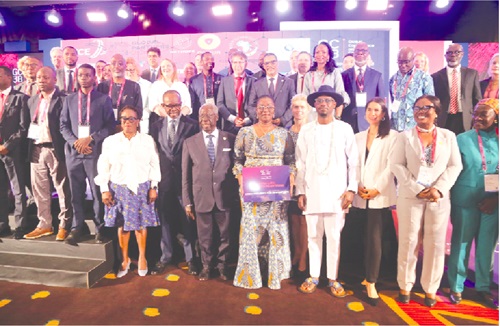
Cybersecurity Global Conference adopts blueprint to safeguard digital space
A global conference on cyber capacity building in Accra has adopted an action framework that outlines intentional measures and resources needed to build a resilient cyber architecture.
Advertisement
The framework, dubbed “The Accra Call” was endorsed by representatives of governments and organisations from across the globe.
The Accra Call is both a blueprint and a motivation for voluntary action to strengthen the role of cyber resilience as an enabler for sustainable development and sustainable cyber capacity building.
It is also to foster stronger partnerships and better coordination, and unlock financial resources and implementation modalities for cyber resilience.
Global Conference
The Accra Call was adopted in Accra at the opening of the maiden edition of the Global Conference on Cyber Capacity Building (GC3B) hosted by the government of Ghana.
Held on the theme: “Cyber Resilience for Development”, it was organised by the Global Forum on Cyber Expertise (GFCE), the Cyber Peace Institute, the World Bank, the World Economic Forum and Ghana’s Cyber Security Authority.
Digitisation benefits
President Nana Addo Dankwa Akufo-Addo in a speech read on his behalf by the Senior Advisor to the President, Yaw Osafo-Maafo, said digitisation of economies, governments and societies had led to numerous benefits and contributed to socio-economic development.
However, he said cyber threat had been on the rise as technology advanced, making it imperative for state and non-state actors to build the relevant skills, knowledge and infrastructure to safeguard their digital assets, investments in information communication technologies (ICTs) and other digitisation initiatives.
President Akufo-Addo also called for strong partnerships and diversified financial resources to address the increasing threats posed by cyber security risks.
“These challenges call for the need for governments, businesses and stakeholders within the cyber ecosystem to collaborate and develop holistic strategies that will address these complex threats,” he said.
He said the World Economic Forum’s 2022 edition of the Global Risks Report indicated that there was a three million undersupply of cyber professionals.
“It is imperative that we strengthen international cooperation efforts now more than ever to enable us to bridge existing cyber security gaps,” the President said.
Initiatives
The Minister of Communications and Digitalisation, Ursula Owusu-Ekuful, said the government was committed to digitisation and cyber security issues and was working on bridging the digital divide to enable equitable connectivity which was critical to Ghana's economic transition.
She said the establishment of the African Continental Free Trade Area (AfCFTA), with its secretariat in Ghana, aimed to connect 1.3 billion people across the 55 African countries with a market size of $3 trillion and to create the largest trade bloc in the world, was a signal of the continent’s digital marketing strategy.
Threats
On cyber threats, Mrs Owusu-Ekuful said Positive Technologies, a cyber security research organisation, had reported that in the first half of 2022 and 2023, the global financial sector was the most hit with cyber attacks recording 18 per cent, followed by telecommunications companies, 13 per cent; government agencies 12 per cent; trade organisations, 12 per cent, and the industrial sector, 10 per cent.
Africa, she said, experienced the highest average number of weekly cyber attacks per organisation in the second quarter of 2023 with an average of 2,164 attacks, establishing a significant year-on-year increase of 23 per cent compared to the same period last year.
“These increasing threats mean we must prioritise our cyber security efforts both at the national and international level,” she said.
Redoubling efforts
The President of the Global Forum of Cyber Expertise (GFCE) Foundation, Chris Painter, said GFCE was created in 2015 as a multi-stakeholder platform motivated by the global need for more cooperation and coordination for cyber capacity building.
He said the Accra Call for Cyber Resilient Development would serve as a lighthouse as the world redoubled efforts to mainstream cyber resilience across national and international development agenda.





